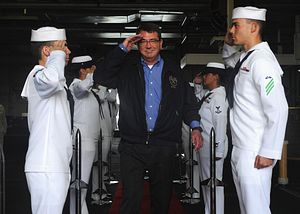Speaking in Honolulu, Hawaii—the United States’ Pacific outpost—U.S. Defense Secretary Ashton Carter remarked that China’s attempts to spread its influence and change the status quo in the South China Sea would backfire, leaving it a pariah in the region. Carter delivered the remarks at a ceremony marking a change of command for U.S. Pacific Command (PACOM)—Admiral Samuel Locklear ceded command to Admiral Harry Harris. The statements are notable for their relative directness about the United States’ future intentions for its own role in the Asia-Pacific, and how the Pentagon’s top leadership sees China’s prospects for influence in Asia. As ties between the U.S. and China heat up over the South China Sea and cyber issues, Carter’s comments could prove to draw a sharp response.
“We want a peaceful resolution of all disputes, and an immediate and lasting halt to land reclamation by any claimant,” Carter said in his prepared remarks. “We also oppose any further militarization of disputed features.” He continued: “And there should be no mistake: The United States will fly, sail, and operate wherever international law allows, as we do all around the world.”
“China is out of step with both international norms that underscore the Asia-Pacific’s security architecture, and the regional consensus in favor of non-coercive approaches to this and other long-standing disputes,” Carter added. In a sharp rebuke to China’s rising status in Asia, Carter noted that the United States intended to remain “the principal security power in the Asia-Pacific for decades to come.”
As Defense News‘s Aaron Mehta notes, the remarks are among Carter’s “most forceful” on China and the South China Sea. Carter, prior to his nomination, was expected to bring his reputation as a sharp-tongued realist to the office of the secretary of defense. Just last week, Carter displayed his willingness to veer from the Obama administration’s carefully manicured rhetorical positions when he attributed U.S. setbacks in Iraq to the Iraqi security forces’ lack of a “will to fight.” Those remarks embarrassed the administration and drew the ire of Iraqi leadership, but they impressed U.S. military leaders who hailed him “as a hero of sorts,” according to Politico.
Beyond Carter, other senior U.S. officials have been speaking out more assertively on China’s moves in the South China Sea as well. For instance, last week, speaking to graduates of the U.S. Naval Academy, U.S. Vice President Joe Biden remarked that the while “the United States does not privilege the claims of one nation over another,” it will “unapologetically stand up for the equitable and peaceful resolution of disputes and for the freedom of navigation.” He added that “today these principals are being tested by Chinese activities in the South China Sea.”
Biden’s and Carter’s remarks have been backed with U.S. action. As The Diplomat noted last week, the U.S. is sending military surveillance aircraft—and soon, maybe even ships—to test the limits of China’s sovereignty in the South China Sea. Last week’s episode involving a P8-A Poseidon surveillance aircraft captured the shifting U.S. posture on China’s reclamation work in the South China Sea.

































